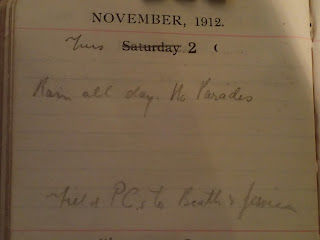18 October1915:
'Still in firing line. Lot of shells and trench mortar coming over. Six men of No.3 platoon buried.
Communication trench behind my sentry post shelled heavily in the evening. Wood and I nearly strafed.'
This is the only mention Louis makes of 'Wood'. There appear to have been at least two Woods in the Scots Guards in France at the time. One would have been Harry Blanshard Wood who joined the 2nd Battalion in August 1914 and was with the Battalion at this time in Loos.
We know this because he subsequently won a VC in 1918:
The citation in the London Gazette reads:
For most conspicuous bravery and devotion to duty during operations at the village of St. Python, France, on 13 October 1918. The advance was desperately opposed by machine guns and the streets were raked by fire. His platoon sergeant was killed and command of the leading platoon fell to him.
The task of the company was to clear the western side of the village and secure the crossing of the River Selle. Command of the ruined bridge had to be gained, though the space in front of it was covered by snipers. Corporal Wood boldly carried a large brick out into the open space, lay down behind it, and fired continually at these snipers, ordering his men to work across while he covered them by his fire. This he continued to do under heavy and well-aimed fire until the whole of his party had reached the objective point.
He showed complete disregard for his personal safety, and his leadership throughout the day was of the highest order. Later, he drove off repeated enemy counter-attacks against his position. His gallant conduct and initiative shown, contributed largely to the success of the day's operations.
Blog note:
If you have any connection with Louis Harley or any of the men listed in his diaries, or if you have found this useful please add a comment.

















































